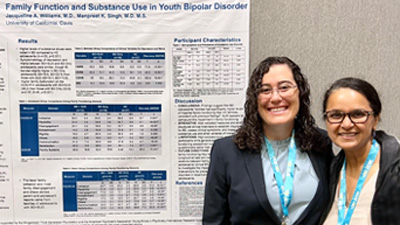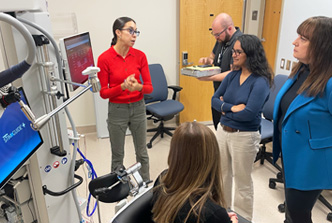The Mood Disorders Research Program at UC Davis specializes in developing innovative approaches to evaluate, treat, and prevent mood and related disorders in youth, young adults and adults. The program has a three-fold mission of advancing scientific discovery, improving care, and training the next generation of clinicians and researchers dedicated to the research, treatment, and prevention of bipolar disorder.
Currently, the research program is embarking on a number of clinical trials to test the efficacy and safety of pharmacotherapies, behavioral therapies, transcranial magnetic stimulation and deep brain stimulation.
Robert H. Putnam Endowed Chair in Bipolar Disorders Research and Treatment
Psychiatry and Behavioral Sciences
mpksingh@ucdavis.edu
Our Focus Areas

Research
Our research focuses on unraveling the complexities of the origins and pathways of psychiatric disorders that start during childhood, and finding ways to protect and preserve function throughout lifespan.

Patient Care
Our research program seeks to investigate, measure and improve clinical care and outcomes for patients receiving psychiatric care for mood disorders and treatment-resistant depression.

Training
Our aim is to recruit, train and sustain the next generation of basic, translational clinical researchers in treatment resistant depression and other mood disorders, including bipolar disorder.
Our Research Team
 Key Collaborators
Key Collaborators
We premise our research work on a collaborative, multidisciplinary approach.
Some of our key UC Davis collaborators include:
Amanda Guyer, Ph.D.
Guyer is co-director of the Center for Mind and Brain and a professor in Human Development and Family Studies.
Jill Silverman, Ph.D.
Silverman is a professor in the Department of Psychiatry and Behavioral Sciences and the MIND Institute and a basic and translational science researcher in neurodevelopmental disorders. Visit the Silverman Lab for more about her work.
Julie Schweitzer, Ph.D.
Schweitzer is a professor in the Department of Psychiatry and Behavioral Sciences and Director of the Attention, Impulsivity and Regulation (AIR) Program at the MIND Institute.
Nicole Schultz, Ph.D.
Schultz is a clinical psychologist who provides evidence-based psychotherapy to adults. Her research interests include understanding environmental variables that systematically influence self-reported and actual drinking behavior (e.g., drinking context, peer groups), motivational models of substance use behavior, and prevention and intervention for substance use among young adults with focused interests in leveraging technology to improve assessment and inform adaptive interventions to reduce in-the-moment risks.
Nikos Karakashian, M.D.
Karakashian is a board-certified psychiatrist and family practitioner in Sacramento, California. He is affiliated with UC Davis Medical Center and Sacramento Veterans Affairs Medical Center.
 Meet Our Team
Meet Our Team
Our researchers are active in the biology of mental illness and have published extensively on the neurobiology and psychopharmacological treatment of pediatric mood disorders. Currently, our team’s research and clinical interests involve testing the efficacy and safety of a spectrum of interventions including pharmacotherapies, behavioral therapies, transcranial magnetic stimulation, and deep brain stimulation.
Team members at the Advanced Psychiatric Therapeutics Clinic include:
Manpreet Singh, M.D., M.S., Program Director
James Bourgeois, O.D., M.P.A., M.D.
Matthew Settle, N.P.
 Meet Our Trainees
Meet Our Trainees
We have several trainees who play important roles in our research program. Meet our trainees!
Sally Bae, M.D.
Research track resident focusing on transcranial magnetic stimulation in post-acute suicidal ideation and difficult-to-treat depression
Jake Branchini
ARC-MD medical student interested in substance use disorders and advanced psychiatry interventions
Emma Hare, D.O.
Child and Adolescent Psychiatry Fellow working on measurement of aggression in youth
Maitri Khanna
PhD Neuroscience student interested in investigating the neurobiology of placebo response using neuroscience tools including EEG and MRI in the context of clinical trials
Natalia Khodhayari, PhD
Neuroscience postdoctoral fellow interested in investigating mechanisms of attentional control and regulation using EEG and MRI tools
Zachary Springs
ARC-MD medical student interested in substance use disorders and advanced psychiatry interventions
Maria Fermanda Parada Valencia
Fellow for the UC Davis MIND Institute International Training Program in Neurodevelopmental Disabilities interested in attentional dysfunction and family interventions in youth
Jacqueline Williams, M.D.
Adult psychiatry resident focused on clinical trials
 Meet Our Alumni
Meet Our Alumni
Hosanna Kim, M.D.
Adult psychiatry resident focused on neurodevelopment
Current Clinical Studies
We have the following clinical studies underway.

TRANSCEND Study
The TRANSCEND clinical study is for people with depression who have been unable to find relief from their symptoms after at least four antidepressant treatments. The study is evaluating the safety and effectiveness of deep brain stimulation for treatment resistant depression.
Learn more about the TRANSCEND study

Brain Stimulation Pilot Study
This study aims to see if a treatment called Transcranial Magnetic Stimulation (TMS) can help people who feel depressed and have had thoughts of suicide.
Learn more about the Brain Stimulation Pilot study

AIR Study
This study aims to better understand aggressive behavior in children and teens through a short questionnaire to see how well it helps doctors learn about aggression and find better ways to treat it.

Related Publications
For over 20 years, first at the University of Cincinnati and then at Stanford University, Manpreet K. Singh, M.D., M.S., has dedicated her career to unraveling the complexities of bipolar and other mood disorders. She has more than 200 published articles, several of which can be found on PubMed via this link.
Following are a few of her published works:
- Trapp N, Purgianto A, Taylor J, Singh MK, Oberman L, Mickey BJ, Youssef N, Solzbacher D, Zebley B, Cabrera LY, Conroy S, Cristancho M, Richards JR, Flood MJ, Barbour T, Blumberger DM, Taylor SF, Feifel D, Reti IM, McClintock SM, Lisanby S, Husain MM (In Press). Consensus review and considerations on TMS to treat depression: A comprehensive update endorsed by the National Network of Depression Centers, the Clinical TMS Society, and the International Federation of Clinical Neurophysiology. Clinical Neurophysiology (2025).
- Gorelik, A, Gorelik M, Ridout KK, Nimarko A, Peisch V, Kuramkote S, Low M, Nrusimha A, Pan T, Singh S, Singh MK. Evaluating efficiency and accuracy of deep-learning based approaches on study selection in systematic reviews. Natural Mental Health (2023).
- Singh MK, Nimarko A, Garrett A, Gorelik, A, Roybal D, Walshaw P, Chang KD, Miklowitz D. Changes in intrinsic brain connectivity in family-focused therapy versus standard psychoeducation among youth at high risk for bipolar disorder. J Am Academy of Child Adolesc Psychiatry (2021) .
- Singh MK, Kelley RG, Howe M, Reiss AL, Gotlib IH, Chang KD. Reward processing in healthy offspring of parents with bipolar disorder. JAMA Psychiatry (2014).
- Singh MK, Kesler S, Husseini H, Kelley R, Amatya D, Hamilton J, Chen M, Gotlib I. Anomalous gray matter structural networks in major depressive disorder. Biological Psychiatry (2013).


